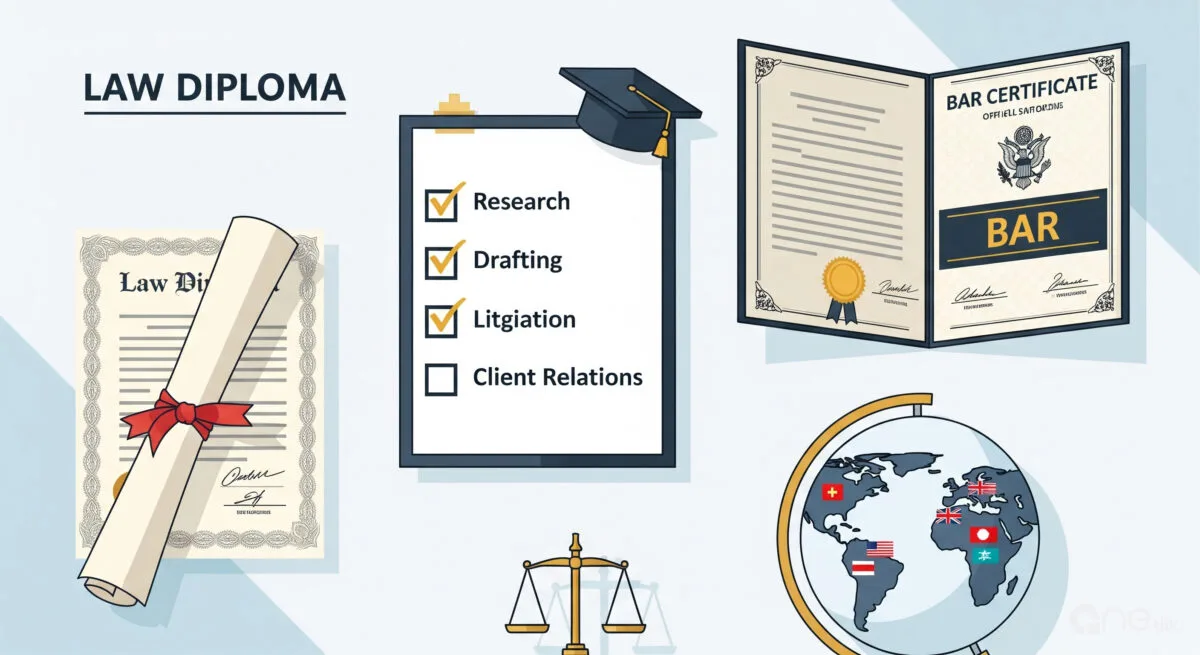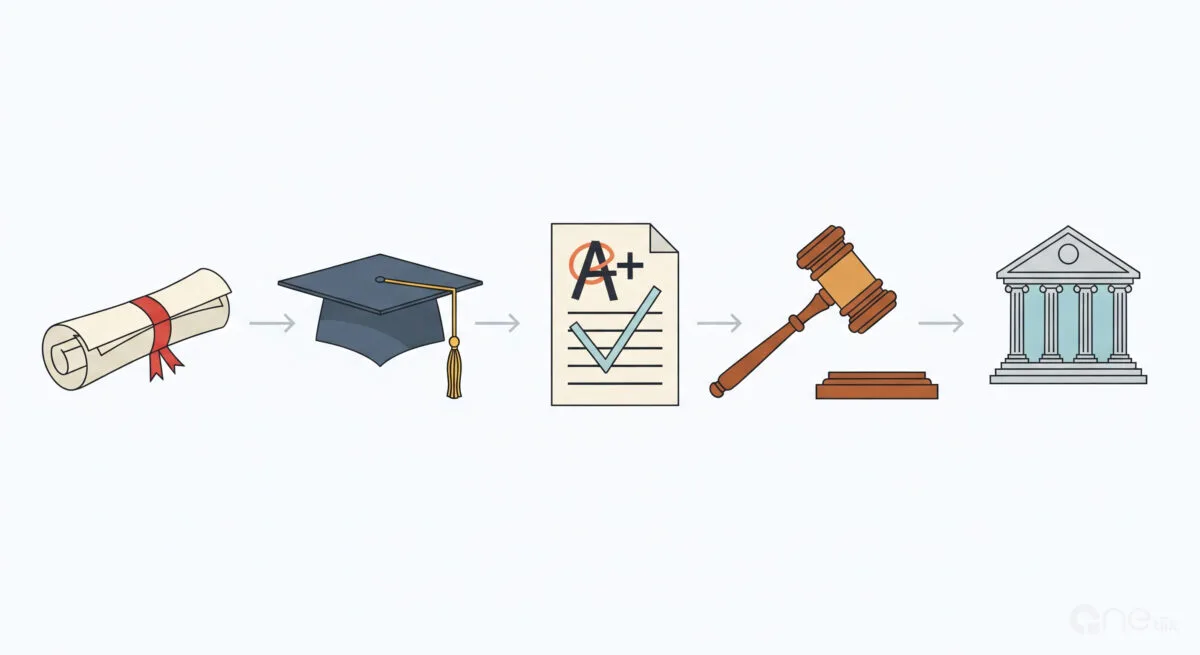Introduction
Becoming a judge is a rewarding career path that offers the chance to uphold justice and make a real difference in people’s lives. If you’ve ever wondered, “How can I become a judge?” or “What does it take to be a judge?”, you’re in the right place. In simple terms, a judge’s position requires a solid legal education, years of courtroom experience, and a strong sense of fairness and integrity.
First, you’ll need to earn a law degree, whether it’s an LL.B., J.D., or its equivalent where you live. While in school, focus on courses that sharpen your critical thinking and ethics, because these are the heart of good judgment. After graduation, passing the bar exam is your next milestone. This test proves you understand the law well enough to practice as a lawyer.
Once you’re a licensed attorney, it’s time to gain real-world experience. Most judges spend at least five to ten years working as lawyers, often serving as public prosecutors, defense attorneys, or judicial clerks. This work gives you insight into courtroom procedures and teaches you how to analyze complex cases—skills every judge needs. Along the way, build a reputation for honesty, clear reasoning, and compassion. Strong character references and community involvement can also boost your chances when you apply for a judge position.

In many regions, judges are either appointed or elected. The process of becoming a judge varies: some places hold competitive exams or interviews, while others rely on political nominations or elections. Make sure you understand the specific requirements and timelines in your area so you can plan effectively.
Ultimately, becoming a judge isn’t just about meeting requirements; it’s about embodying the principles of justice. If you’re passionate about the law, committed to fairness, and ready to lead in the courtroom, you’re on the right track to achieving this esteemed role.
Who Can Become a Judge?
Not everyone can step onto the bench; becoming a judge has clear eligibility rules and expectations. First and foremost, you must meet the basic legal and personal criteria:
- Citizenship and Residency
- In most countries, you need to be a citizen or a permanent resident.
- Some jurisdictions require you to live for a certain number of years in the state or region where you seek appointment or election.
- Clean Legal Record
- A spotless criminal record is essential. Any past convictions, especially those involving dishonesty, can disqualify you.
- You must also maintain good standing with your local bar association, which means no disciplinary actions or suspensions.
- Educational Background
- A law degree (LL.B., J.D., or equivalent) from an accredited university is mandatory.
- You must pass the bar exam or its regional equivalent to practice law.
- Professional Experience
- Most courts expect at least five to ten years of legal practice. Common paths include working as a defense attorney, prosecutor, or judicial clerk.
- Serving in specialized roles like family law, tax court, or appellate clerkships can strengthen your application for a judge position.
Personal Qualities That Matter
Beyond formal qualifications, “who can become a judge” also depends on your character and skills:
- Decision-Making Ability
Judges must analyze facts impartially and make clear, well-reasoned rulings under pressure. - Integrity and Fairness
A judge’s reputation hinges on honesty. Fair treatment for everyone in the courtroom builds public trust. - Critical Thinking
You’ll encounter complex legal issues daily. Strong analytical skills help you interpret statutes and precedents accurately. - Emotional Intelligence
Managing courtroom dynamics with empathy while remaining firm is key to maintaining respect and order.
By combining the right legal credentials with these personal traits, you’ll position yourself as a strong candidate when you ask, “Who can become a judge?” and pursue that coveted judge position.
What Does It Take to Be a Judge?
Becoming a judge isn’t just about knowing the law; it’s about having the right mindset, emotional control, deep legal knowledge, and solid experience. If you’re wondering “what does it take to be a judge?”, here’s a straightforward look at the key qualities and challenges involved, and why “how hard is it to become a judge” really depends on more than just academics.
1. Mindset of Fairness and Humility
A judge must always put fairness first. That means setting aside personal opinions and treating everyone, plaintiffs, defendants, and attorneys, with equal respect. Humility helps you listen openly and admit when you need more information, which builds trust in your courtroom.
2. Emotional Control Under Pressure
Courtrooms can be tense. You’ll read or hear disturbing details, face heated arguments, and manage strict timelines. To stay effective, judges need excellent emotional control. Remaining calm, patient, and composed even when cases get heated ensures you make clear, rational decisions and maintain order.
3. Deep Legal Knowledge
Strong familiarity with statutes, case law, and legal procedures is a given. A judge must interpret complex rules and apply them correctly. This means continuous learning, attending workshops, reviewing new legislation, and staying updated on landmark rulings. Your role demands both breadth (knowing many areas of law) and depth (mastering your court’s specialty).
4. Practical Experience
Experience as a practicing lawyer is invaluable. Many judges have served as prosecutors, defense attorneys, or clerks before joining the bench. This hands-on background teaches you courtroom etiquette, evidence handling, and the nuances of witness testimony. It’s this real-world practice that answers the common question “how hard is it to become a judge?” because the journey often takes a decade or more of dedicated work.
5. Strong Decision-Making Skills
Judges weigh evidence, listen to arguments, and then issue rulings that affect people’s lives. Clear reasoning, logical analysis, and the ability to write well-supported opinions are critical. Over time, your decisions build a record of fairness and competence.
In short, the path to the bench is challenging but rewarding. It demands a disciplined mindset, steady emotions, deep legal expertise, and years of experience. If you’re passionate about justice and ready for the hard work, you’re already on your way.
Qualifications and Requirements to Be a Judge.

Becoming a judge involves meeting specific criteria in education, experience, character, and selection processes. Here’s a clear breakdown of the requirements to be a judge and the qualifications for becoming a judge.
1. Educational Requirements
- Law Degree: You must earn an accredited law degree (LL.B., J.D., or equivalent). This satisfies the basic judge education requirements.
- Undergraduate Major: While no single major is mandatory, degrees in political science, history, or philosophy develop critical thinking. Still, most candidates focus on law from day one.
- Continuing Education: Many jurisdictions require judges to complete ongoing legal education to stay current on statutes and case law.
2. Work Experience (Usually as a Lawyer)
- Minimum Practice Years: Typical courts demand 5–10 years of legal practice. This answers “how can I become a judge?” by showing the need for hands-on experience.
- Professional Roles: You might work as a public prosecutor, defense attorney, or judicial clerk. Specialized experience (e.g., family law or appellate work) can strengthen your profile.
3. Character References
- Good Standing: You must have a clean bar record with no suspensions or ethics violations.
- Personal Integrity: Judges need strong reputations for honesty. Character references from respected lawyers, former judges, or community leaders can tip the scales in your favor.
- Community Involvement: Volunteer work, bar association leadership, or teaching law can demonstrate your commitment and character.
4. Examinations or Nominations (As Per Country)
- Competitive Exams: In some regions, you’ll sit for judicial exams testing legal knowledge and reasoning.
- Nomination/Appointments: Other countries use panels, political appointments, or elections. Understanding your jurisdiction’s process is key to planning your path.
- Interviews and Vetting: Most systems include background checks, interviews, and assessments of your temperament and ethical judgment.
By fulfilling these judge education requirements, gaining robust legal experience, securing strong character references, and navigating your jurisdiction’s selection process, you’ll meet the core qualifications for becoming a judge.
What Major or Degree Is Required?

Choosing the right major or degree lays the foundation for any judicial position. While the path can vary by country, these are the most common academic routes:
1. Law Degrees
- LL.B. (Bachelor of Laws): In many countries, this is the primary undergraduate law degree. It covers core legal subjects like contracts, torts, and constitutional law.
- J.D. (Juris Doctor): Predominant in the United States, the J.D. is a graduate program taken after earning a bachelor’s degree. It focuses on critical legal reasoning and practical skills.
- B.A. in Law: Some universities offer a combined bachelor’s program with an emphasis on law and liberal arts, giving you both broad knowledge and legal basics.
2. Undergrad Majors for Future Judges
While everyone aiming for the bench needs a solid law degree, your bachelor’s major can add valuable perspective:
- Political Science: Helps you understand government structures, public policy, and political theory useful for interpreting laws.
- Public Administration: Teaches you how governments and courts operate, plus skills in management and ethics.
- History or Philosophy: Sharpens critical thinking and research skills, offering context for legal precedents.
3. Why Your Degree Matters
Your education for a judge does more than check a box. A specialized major can:
- Deepen your understanding of how laws affect society.
- Strengthen your analytical and writing skills—key for drafting clear opinions.
- Help you stand out in competitive judicial selections or exams.
Ultimately, you’ll need a recognized law qualification (LL.B., J.D., or equivalent) to meet formal judge education requirements, but your choice of undergraduate major can set you apart and enrich your outlook on justice.
Steps to Become a Judge (With Timeline)

Here’s a clear step-by-step timeline for the process of becoming a judge, often asked as “how does one become a judge” and “steps to become a judge”:
| Step | Action | Typical Duration |
|---|---|---|
| 1 | Finish high school (focus on critical thinking, debate, and pre-law electives) | 12 years (till age ~17–18) |
| 2 | Get a bachelor’s degree (Political Science, Public Admin., History, or any solid Pre-Law major) | 3–4 years |
| 3 | Pass law school entrance exam (e.g., LSAT, CLAT, etc.) | Varies; exam prep 6–12 months |
| 4 | Attend and complete law school (LL.B. / J.D. / equivalent) | 3–4 years |
| 5 | Pass bar exam (state or national) | Exam cycle 6–12 months |
| 6 | Gain legal experience (work as a lawyer or judicial clerk) | 5–10+ years |
| 7 | Apply for or get nominated/elected to a judgeship | Application window varies |
| 8 | Clear the judicial selection process (interviews, exams, vetting) | 6–18 months |
Brief Explanation of Each Step
- Finish High School
Early focus on debate, writing, and critical analysis builds the foundation. - Bachelor’s Degree
While any major works, law-related fields strengthen your understanding of the legal system. - Law School Entrance Exam
Standardized tests (LSAT, CLAT, etc.) assess reasoning and reading comprehension. - Law School
In-depth study of statutes, case law, procedure, and ethics. - Bar Exam
A licensing exam that qualifies you to practice law. - Legal Experience
On-the-job training as an attorney or clerk teaches courtroom skills and case management. - Application/Nomination
Research your jurisdiction’s method of competitive exams, political appointments, or elections. - Selection Process
Final vetting includes interviews, background checks, and sometimes further testing.
This roadmap outlines the process of becoming a judge and shows that how does one become a judge is a journey of education, rigorous testing, and substantial professional experience.
How Long Does It Take to Become a Judge?
One of the most common questions aspiring jurists ask is “how long does it take to be a judge?” or “how long does it take to become a judge?” While timelines vary by country and court level, here’s a general breakdown:
- Law Education: 5–7 Years
- Undergraduate Degree (3–4 years): Most candidates earn a bachelor’s first, often in law, political science, or a related field.
- Law School (2–3 years): In jurisdictions with a J.D. or LL.B. program, this period covers in-depth legal study and practical skills.
- Professional Experience: 5–15 Years
- Early Practice (5–10 years): After passing the bar exam, you’ll work as an attorney serving as a prosecutor, defense lawyer, or judicial clerk. Gaining courtroom exposure and building your legal reputation is crucial.
- Advanced Roles (optional, 5+ additional years): Some judgeships, especially higher courts, expect seniority. Serving as a senior advocate, bench counsel, or taking on leadership within your bar association can extend this phase.
- Total Time: 10–20+ Years
- Lower Court Positions: In many regions, entry-level judgeships become attainable after roughly 10 years of combined education and practice.
- Higher Courts: Becoming a high court or supreme court judge often requires closer to two decades of distinguished service.
Factors That Can Shorten or Extend Your Path
- Fast-track Programs: Some countries offer accelerated judicial entry exams that let top graduates sit on the bench sooner.
- Regional Requirements: Residency rules, mandatory clerkships, or specialized training can add months or even years.
- Career Choices: The type of law you practice (civil, criminal, administrative) and your networking within judicial circles also influence how quickly you advance.
Ultimately, the journey to the bench is a long-term commitment often spanning 10 to 20+ years. But with clear goals, dedicated study, and focused experience, you can plan your path and answer once and for all, “how long does it take to become a judge?”
What Age Do You Need to Be a Judge?
When people ask “how old do you have to be a judge?”, the answer depends on where you serve. Here’s a quick look at typical minimums and retirement rules:
- Minimum Age Requirements
- United States (State Courts): Many states set a floor of 25–30 years for trial judges and 30–35 years for appellate or supreme court roles.
- India (High Court): You must be at least 45 years old to be appointed as a High Court judge. For the Supreme Court, the minimum is 50 years.
- United Kingdom: There’s no strict minimum age for judges, but candidates usually have 7–10 years of legal practice before applying, meaning most are in their 30s at the earliest.
- Canada: Provincial courts often require 10 years at the bar, making new judges typically 35+ years.
- Mandatory Retirement Ages
- United States (Federal): Federal judges serve for life, but many choose senior status or retire around 65–75 years.
- United States (State): Mandatory retirement ages range from 70 to 75, varying by state.
- India: High Court judges retire at 62, and Supreme Court judges retire at 65.
- United Kingdom & Canada: Retirement generally occurs between 70 and 75, depending on the jurisdiction.
Why Age Matters
Age requirements ensure you have enough professional experience before taking the bench and that judges remain effective over long tenures. If you’re planning your path, factor in these age rules along with your education and years of practice. That way, you’ll know exactly “how old do you have to be a judge” in your region and when to aim for that milestone.
Is Becoming a Judge Competitive?

Many aspiring jurists wonder, “How competitive is becoming a judge?” or “How hard is it to become a judge?” The answer lies in the selection process, the supply of seats, and the weight of your experience and reputation.
1. Selection Process Difficulty
Whether by exam, appointment, or election, judicial recruitment is rigorous. Competitive exams test legal knowledge, ethics, and reasoning under time pressure. Appointment panels and political bodies often scrutinize your entire career—academic records, high-profile cases, and published opinions all come under review.
2. Number of Seats vs. Candidates
In most regions, there are far more qualified lawyers than available judge positions. A single vacancy may attract dozens or even hundreds of applicants. High courts and specialized benches tend to have fewer openings, making those roles especially competitive.
3. Importance of Experience & Reputation
Your years of practice and the types of cases you’ve handled play a huge role. Judgeships often go to attorneys with a proven track record in complex litigation or appellate advocacy. Community involvement, bar association leadership, and strong character references boost your profile. Building a reputation for fairness, clear writing, and courtroom decorum can set you apart.
4. Networking and Mentorship
Connecting with senior judges, bar leaders, and mentors can provide insights into the selection process and open doors. Although merit is key, knowing the right people and demonstrating consistent integrity helps your candidacy.
In short, how competitive it is to become a judge depends on your jurisdiction’s path, the number of applicants, and your professional standing. While hard, it’s achievable with strategic preparation, solid experience, and a reputation for excellence.
Types of Judges and Positions
The world of judge positions includes a variety of roles, each with its own responsibilities and authority levels. Here are the main types of judges you might encounter:
- District Judge
Often serving in trial courts, district judges handle civil and criminal cases at the first level. They oversee everything from pre-trial motions to full trials, ruling on evidence and instructing juries. This judge position demands strong case-management skills. - Magistrate
Magistrates support higher courts by conducting preliminary hearings, issuing warrants, and managing small claims or minor offenses. In some systems, they’re appointed for specialized tasks (e.g., family or traffic matters). It’s a common entry point into the judiciary. - High Court Judge
Sitting above trial courts, high court judges review appeals and significant original cases. They interpret complex statutes and set legal precedents. Becoming a High Court judge usually requires extensive experience, often 10–15 years of practice. - Supreme Court Justice
At the pinnacle, Supreme Court justices decide landmark cases that shape national law. Their rulings are final, making this the most prestigious judicial position. Selection often involves nomination by executives and confirmation by legislative bodies. - Administrative Law Judge (ALJ)
ALJs preside over disputes involving government agencies, such as social security appeals or environmental regulations. They combine judicial and technical expertise, producing decisions that balance regulatory rules with individual rights.
Each type of judge plays a crucial role in the legal system, offering varied paths depending on your interests, expertise, and career goals.
Can a Lawyer Become a Judge?

Most judges are experienced lawyers before they ever wear the robe. Here’s why and how “do lawyers become judges” in practice:
- Legal Practice as the Foundation
To answer “can a lawyer become a judge?”, remember that judicial roles typically require you to have first honed your skills in the courtroom. Years spent as a defense attorney, prosecutor, or civil litigator teach you about evidence, trial strategy, and courtroom procedure essential for any judge’s position. - Appointments and Promotions
In many systems, judges aren’t elected directly by the public. Instead, qualified lawyers apply or are nominated for vacant benches. A selection committee or political authority reviews your résumé, case history, and character references. If you’re chosen, it’s effectively a promotion from practicing lawyer to life or term-limited jurist. - Judicial Clerkships and Internships
Early-career lawyers often clerk for sitting judges. These clerkships give a close-up view of legal reasoning and opinion writing. Such experience not only clarifies “how does one become a judge,” but also boosts your reputation when you later seek an appointment. - Bar Association and Peer Recognition
Active involvement in bar councils, legal committees, or teaching seminars builds your profile. When selection panels ask, “Do lawyers become judges based on merit?”, they look for demonstrated leadership and integrity in the legal community.
In short, yes, lawyers can and do become judges. By excelling in legal practice, securing strong recommendations, and navigating the appointment or promotion process, you move from advocating cases to deciding them.
Final Tips for Aspiring Judges

Reaching the bench is a marathon, not a sprint. Keep these simple yet powerful tips in mind as you navigate your journey toward a judge position:
- Stay Consistent in Legal Studies
• Treat learning as a lifelong habit. Read new case law, attend workshops, and subscribe to legal journals.
• Set aside weekly study hours even once you’re practicing to sharpen your legal knowledge and stay on top of changes. - Build Strong Professional Ethics
• Integrity is non-negotiable. Always act with honesty and transparency, whether in court or in negotiations.
• Uphold confidentiality and respect client trust; these habits demonstrate the character qualities sought in future judges. - Gain Varied Courtroom Experience
• Volunteer for clerkships or pro bono cases to see different sides of the law.
• Seek roles as a prosecutor, defense lawyer, or civil litigator to develop a rounded perspective on the justice system.
• Handling a wide array of cases will improve your decision-making skills and courtroom confidence. - Network with Legal Professionals
• Join bar associations, legal committees, and local advocacy groups. These connections can lead to mentorships and valuable referrals.
• Attend legal conferences and panel discussions, introduce yourself to judges and senior attorneys. Their insights and endorsements can significantly boost your candidacy. - Cultivate a Reputation for Fairness
• Treat every opposing counsel and client with respect. Your courtroom demeanor reflects on your suitability for a judge position.
• Publish articles or give talks on legal topics to showcase your expertise and balanced perspective.
By combining rigorous study, unwavering ethics, hands-on experience, and strong professional relationships, you’ll build the foundation needed to stand out when it’s time to ask, “How can I become a judge?” and take that final step onto the bench.
FAQs
What is the easiest way to become a judge?
There’s no shortcut; judgeships require solid legal education and experience. However, preparing early by focusing on law-related subjects in college, excelling on your bar exam, and seeking judicial clerkships can streamline your path. Performing well in clerkships often leads to strong recommendations, which makes the selection process a bit smoother.
Can I become a judge without being a lawyer?
In almost all jurisdictions, you must first qualify and practice as a lawyer before you can become a judge. The skills you gain from legal research, courtroom etiquette, and case analysis are essential. Without that background, you wouldn’t meet the requirements to be a judge.
Do judges get training?
Yes. After appointment or election, many courts require new judges to attend specialized judicial training programs. These cover courtroom management, writing opinions, ethics rules, and updates on legislation. Even experienced judges participate in continuing education to stay current.
How are judges appointed or elected?
It depends on your region. Some areas use competitive exams or merit-based panels that review applications and conduct interviews. Others hold elections where voters choose judges. Federal judges in the United States are nominated by the President and confirmed by the Senate. Always check your local process as you plan your career.
Can you become a judge directly after law school?
No. You need several years of legal experience, typically 5 to 10 year,s before you qualify. This time lets you develop the critical thinking and courtroom skills necessary for a judge’s position.
Is there an age limit to becoming a judge?
Most places set a minimum age (often 30 or older) linked to required years of practice. Some jurisdictions also impose mandatory retirement ages, usually between 65 and 75.
How competitive is the selection process?
Very. There are far more qualified lawyers than open judge positions. Success depends on your experience, reputation, exam scores (if required), and professional network.
Feel free to suggest more questions or let me know if you’d like these formatted in an accordion for your blog.
It May Help you!
- General Career Guides
- “Explore our complete guide on how to be good in studies to build habits that will help in law school and beyond.”
- “If you’re planning your future, you may also want to check our detailed article on the best study timetable for students preparing for competitive exams.”
- Exam Preparation / Study Tips
- “Preparing for judicial exams? Here are 3 secret study tips to help you score higher.”
- Career-Oriented Connections
- “Curious about other professions in law? Read our guide on how to become an electrician for a comparison of vocational vs. professional career paths.”
- “Career journeys often take time. If you’re planning, our article on freedom fighters of India shows how persistence shapes history, just as it does in law careers.”





















